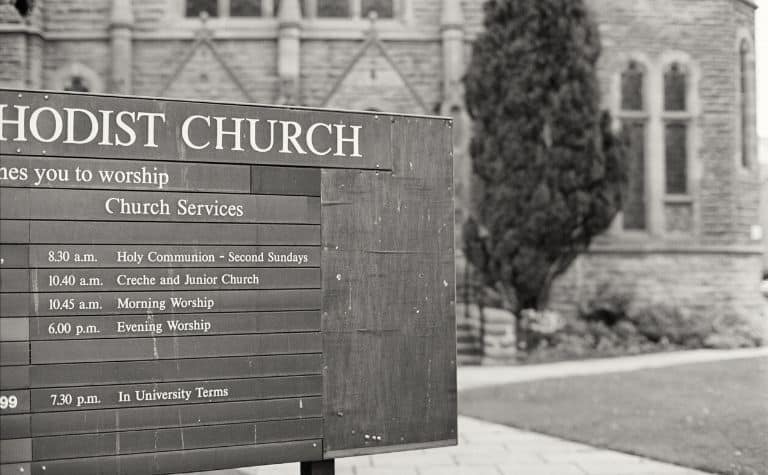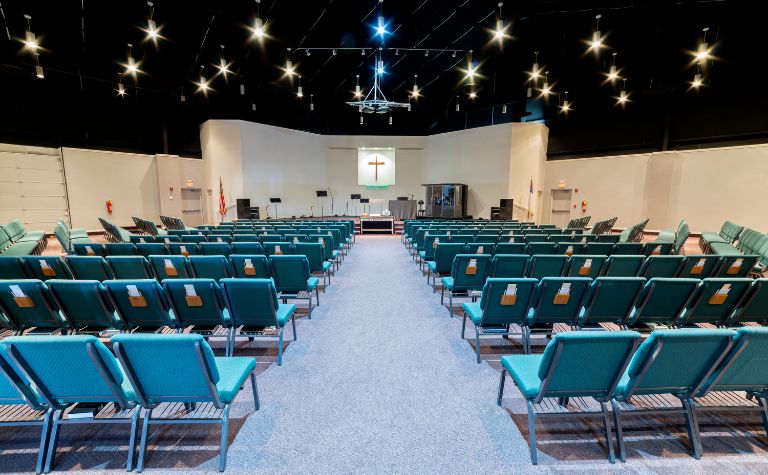The Assemblies of God and Methodist denominations are both traditions within Protestant Christianity. They have significant areas of theological agreement, yet they have important differences, too.
The Assemblies of God, which dates to the early 20th century, is a conservative Pentecostal denomination that emphasizes baptism in the Holy Spirit, for which speaking in tongues is the initial evidence. Methodism, which dates to the middle 18th century, is a collection of churches that trace their history to John Wesley.
How do Methodists and Assemblies of God’s origins, organization, and worldview compare? Do the denominations believe the same about the Trinity, the inspiration of Scripture, spiritual gifts, and the end times? Keep reading to learn more.

Assemblies of God and Methodism Compared
Methodism started in 18th-century England when the Anglican church rejected the reforms that John Wesley proposed.
In contrast, the Assemblies of God started in the early 20th century, when a group of Pentecostal pastors and church leaders sought to unite into one body in the American South. The origins of both denominations helped shape their ministries.
Methodism arose in the shadow of the Anglican church. While Methodism, which is known for its encouragement of spiritual disciplines, broke away from certain ecclesiastical traditions of the Anglican church. (Also see Assemblies of God vs. Foursquare: What’s the Difference?)
For example, Wesley practiced open-air preaching, which the Anglican church forbids. In contrast, the Pentecostal Christians that organized the Assemblies of God were previously loosely connected through shared beliefs and experiences.
In summary, Methodism’s ecclesiastical structure was less organized than the Anglican church, while the Assemblies of God’s origin sought more organization.
| OVERVIEW | Assemblies of God | Methodism |
|---|---|---|
| Founder | Pentecostal pastors and leaders | John Wesley (1703-1791) |
| Origin | Hot Springs, Arkansas; 1914 | 18th-century England |
| Early influencer(s) | Charles Fox Parham (1873-1929), Agnes Ozman (1870–1937), William Joseph Seymour (1870-1922) | Other than John Wesley, Charles Wesley (1707-1788) and George Whitefield (1714-1770) played key roles in the denomination’s formation |
| Significant writing outside the Bible | The 16 Fundamental Truths | The Apostles’ Creed, The Nicene Creed; Wesley edited the 39 Articles of Religion, removing the Calvinist teachings in it; he also edited the Book of Common Prayer after the Revolutionary War; the United Methodist Hymnal |
| Organization | Assemblies of God church are organized according to presbyterian polity (though not theology), at the national level as well as the regional or district level. Individual churches, however, are self-governing. | The term “connectionalism” describes the network of relationships among Methodist churches. “Bishops” lead churches within the framework of the Episcopalian polity. |
| Divisions | Compared with other large Protestant denominations, the Assemblies of God has been free of significant splits. The internal debate has occurred over a number of issues, but the denomination has avoided large protesting factions. | There are many denominations in the Methodist tradition. The United Methodist Church (UMC) is the largest. The African Methodist Episcopal Church (AMEC) is the second largest. |
| Theological and Social worldview | The Assemblies of God denomination is evangelical and conservative, theologically and socially. The denomination ordains women to be pastors, which some Christians consider liberal and progressive. | It depends on the denomination. Many churches in the UMC denomination have adopted liberal perspectives on many social and theological issues in recent decades. Other smaller denominations maintain conservative positions, such as the Evangelical Methodist Church (EMC). |
Also see Assemblies of God vs. Evangelical: What’s the Difference?

Assemblies of God vs. Methodist Beliefs
Methodism and Assemblies of God share many core beliefs, such as the Trinity, the deity of Christ, the resurrection of Christ, and the Second Coming of Christ. Generally, they disagree about baptism in the Holy Spirit, water baptism, and the end times.
| BELIEFS | Assemblies of God | Methodism |
|---|---|---|
| Theology (general) | Assemblies of God is Protestant. They believe that salvation is by grace through faith in Christ alone and not according to works. | Methodism is Protestant. They believe salvation is by grace through faith in Christ alone and not according to works. |
| Theology (specific) | Assemblies of God are Arminian. Within the framework of Arminianism, their belief system is often referred to as “Pentecostal theology.” | Methodists are Arminian. Within the framework of Arminianism, their doctrine is sometimes called “Wesleyan theology” or “Wesleyan-Arminian theology.” |
| God | Assemblies of God believe in the Trinity. There is one God who exists in three persons. | Methodists believe in the Trinity. There is one God who exists in three persons. |
| Is Jesus God? | Yes | Yes |
| Is the Holy Spirit God? | Yes | Yes |
| The Bible | #1 of The 16 Fundamental Truths state, “The Scriptures, both the Old and New Testaments, are verbally inspired of God and are the revelation of God to man, the infallible, authoritative rule of faith and conduct.” | The Bible is inspired, according by traditional Methodist teaching. Some conservative Methodist denominations in America accept and use the term “inerrancy,” which means that Scripture is without error. |
| View of the atonement | Assemblies of God believes in the penal-substitutionary atonement of Christ. His death was the punishment for sin, and he took the place of sinners on the cross. | Moderate-liberal denominations view Christ as a martyr and his death as a form of activism for marginalized people. Conservatives believe Christ died in place of sinners and as a punishment for their sins. |

| BELIEFS | Assemblies of God | Methodism |
|---|---|---|
| Salvation | #5 of The 16 Fundamental Truths state, “Salvation is received through repentance toward God and faith toward the Lord Jesus Christ. By the washing of regeneration and renewing of the Holy Spirit, being justified by grace through faith, man becomes an heir of God, according to the hope of eternal life.” | Methodists are Arminian, as opposed to Calvinists or Reformed. |
| Spiritual gifts | Assemblies of God believes that all spiritual gifts mentioned in the Bible are operational today, including speaking in tongues, divine healing, and miracles. | Some Methodists are cessationists. Others are continuationists. Pentecostal expressions have been associated with revivalism in the Methodist tradition, which has historically been a topic of internal debate and tension. |
| Water Baptism | Believer’s baptism; only professing believers, not infants, are baptized. Baptism isn’t necessary for salvation. | Pastors baptize infants as a sign of regeneration. Adult converts can be baptized, often by sprinkling. Baptism isn’t necessary for salvation. |
| Communion | #6 of The 16 Fundamental Truths state, “The Lord’s Supper, consisting of the elements — bread and the fruit of the vine — is the symbol expressing our sharing the divine nature of our Lord Jesus Christ, a memorial of his suffering and death, and a prophecy of His second coming, and is enjoined on all believers ’till He comes!'” | Methodists believe in the real presence of Christ, making it more than a mere memorial like in some Protestant traditions, but they don’t believe in transubstantiation as Catholicism teaches. |
| Eschatology | #14 of The 16 Fundamental Truths state, “The second coming of Christ includes the rapture of the saints, which is our blessed hope, followed by the visible return of Christ with His saints to reign on earth for one thousand years.” | The Second Coming of Christ is a primary doctrine; the millennium is understood according to Amillennial theology; meaning it interprets the 1,000-year period described in Revelation 20:1-6 figuratively and defines it as the time between Christ’s first and second coming (i.e., the Church Age) |
Also see Assemblies of God vs. Catholic: What’s the Difference?
References:
[1] Source
[2] Source
[3] Source
Related Questions
The Assemblies of God and Baptist traditions are sizable and significant branches of Protestant Christianity. They each have a fascinating history in Europe, America, and as of the twenty-first...
The Assemblies of God and the Church of God (Cleveland, Tennessee) are two of the oldest Pentecostal denominations in the world. There is a lot that unites these Protestant-Christian traditions, yet...
